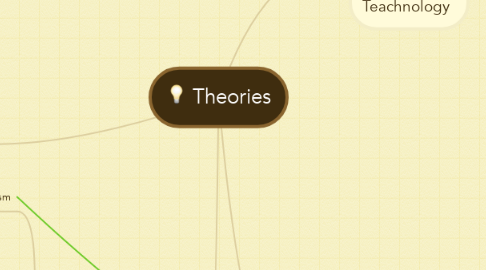
1. Learning Theories
1.1. Connectivism
1.1.1. ...Is in the diversity of opinions
1.1.2. ...Is that "learning" is more important than "knowing"
1.1.2.1. Active learning style.
1.1.3. ...Is making connections between what one has learned and how one has learned it.
1.1.3.1. The teacher's job is to help make those connections through activities.
1.2. Constructivist
1.2.1. ...encourages learning through the learner's culture.
1.2.1.1. Encourages learners to "arrive at his or her version of the truth" (Wertsch 1997)
1.2.2. ....encourages self-directed learning
1.2.2.1. The teacher is more of a facilitator than a lecturer.
1.2.2.1.1. Active learning style.
1.2.3. ..views learning as a social process.
1.2.3.1. Collaboration is strongly recommended (Piaget)
1.3. Cognitive Lead
1.3.1. ....is aimed at helping stimulate the ability to solve problems.
1.3.1.1. Thinking and reasoning skills... Memory is a huge one.
1.3.2. ...is the exploration of short and long-term memory information retaining.
1.3.3. ....has a level of difficulty associated with instructional materials that is not managed by the instructor
1.3.3.1. "intrinsic"
1.3.4. ...has a workload that is managed by the instructor.
1.3.4.1. "Extraneous"
2. TPACK
2.1. …is a framework that helps teachers figure out how to teach effectively with technology by figuring out what the teachers need to know.
2.2. ...consists of 7 different knowledge areas.
2.2.1. Content Knowledge (CK)
2.2.2. Pedagogical Knowledge (PK)
2.2.3. Technology Knowledge (TK)
2.2.4. Technological Content Knowledge (TCK)
2.2.5. Technological Pedagogical Knowledge (TPK)
2.2.6. Technological Pedagogical Content Knowledge (TPCK)
2.2.7. Pedagogical Content Knowledge (PCK)
2.3. (which in turn consists of three different areas of knowledge needed by teachers)
2.3.1. Technology
2.3.2. Pedagogical
2.3.3. Content
2.4. …is something that teachers are encouraged to use as an organizing frame to develop their own ideas.
2.5. …does not mean that new technology must be introduced, but rather to encourage creative use of readily available technology.
3. Technology-based Theories
3.1. Social Construction of Technology
3.1.1. ....has a very flexible definition.
3.1.1.1. The design of which is very flexible as well.
3.1.2. ...is relevant in different ways to different socio-economic groups.
3.1.3. ...is completely dependant on people (IE Their likes, dislikes).
3.1.3.1. While most people believe that some jobs will be replaced by computers, it is the consumer that decides this.
3.1.3.2. Also relevant to companies and products (Tapes VS CDs, Blu-Ray vs HD DVD)
3.2. Media Ecology
3.2.1. ...is the theory that people are completely dependant on media.
3.2.1.1. Controls "virtually" all walks of life.
3.2.1.2. This is the opposite theory of SCOT
3.2.2. ....changes how we perceive information.
3.2.2.1. Mobile devices and wireless internet are two examples of how we receive a constant flow of information.
